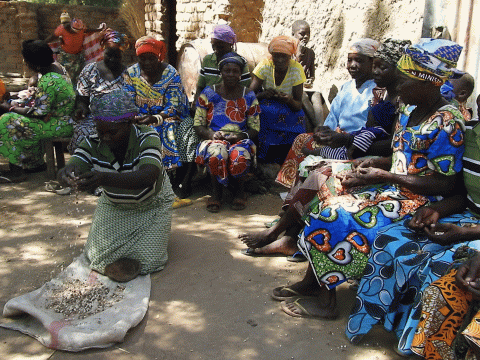Rosalie, a better life with moringa

Rosalie is one of the four women participants in the training on moringa cultivation techniques organized in 2014 and financed by World Vision in Germany. Originally from Ba lli in Mayo - East Kebbi, this mother of 9 children decided to put her acquired knowledge at the service of her family and community.
We are in Ba lli, 193 km south-east of N'djamena. Sitting under a neem tree at the beginning of this afternoon, about twenty women - all joyful and singing - are busy husking moringa seeds; the first step in the production of the oil from the tree known as the tree of life because of its many virtues. Among them, one woman stands out for her dexterity in stripping the moringa seeds of their husk: this is Rosalie.
The only participant from her village in the moringa training provided by World Vision in Chad in 2014, Rosalie is one of the four women from the Development Program (AP) of Ba lli in the Mayo - Kebbi East Region, beneficiaries of this initiative financed by World Vision in Germany. Coming from a community in which women are the main beneficiaries of fieldwork but above all the most affected by poverty, Rosalie, on returning from her training, starts from this observation in order to convince the other women with a view to making the moringa grain processing project a real source of development and improvement of the living conditions of the women and children of the community.
"Participating in this training has helped me a lot. Today, I am a model for other women in the community, and I am able to provide for my children. With the income from the moringa culture, I pay for my children's healthcare and schooling. In the very beginning, I was the only one growing moringa. One year later, in view of my experience, I thought why not share my knowledge with the other women in my village; may I myself have gained it from others. This will enable them to provide for their children, as they do for me: and so I decided to teach them how to sow moringa seeds. I used to organize training sessions for women on the benefits of moringa; I would invite them to observe my children, to see how they are - how healthy they are. And I would confess to them that my family and I were no longer hungry, let alone malnourished!" Rosalie says as she crushes the moringa seeds with a stone.
Moringa, a community development plant
Rosalie didn't just teach the women the technique of growing moringa. Working on her own for a year made her understand that to make this project a real source of development, you have to work as a group, uniting forces and materials to achieve a result that benefits the whole community. So she decided to create a group.
"I found that individual work didn't give us much in the way of production," says Rosalie. The group is called Faina (which means "For us" in the Massa language).
At the beginning of the Faina adventure, the group was made up entirely of women. But as time went by, Rosalie was surprised to see a massive adhesion of men to the group: the Massa society being patriarchal, women do not have the right to make decisions in the presence of men.
Thanks to Rosalie's efforts, moringa, which was little known by the community, is now cultivated and consumed in more than twenty villages of the Development Program of World Vision in Chad. In these villages, the cultivation of moringa has become everyone's business: men, women and even children; and in each household orchard, one or two plants can be found. Today, there are moringa fields in the community despite the fact that the soil in the area is not compatible for moringa cultivation.
"Thank God the moringa plant grows fast! Once the seed is sown, the leaves can be harvested after three months," Rosalie teaches us with a smile on her face.
The benefits of moringa
With the sale of products made from the so-called miraculous plant (because of its energy supply in vitamins, minerals and its ability to treat several diseases) in powder form, fresh leaves and oil, the Rosalie group has been able to contribute 150,000 CFA francs (about US$252) to the project to build a water borehole to be used for watering the field during the dry season, but also to the entire community. For the members of Fana, the income obtained constitutes a savings fund to be used for the schooling of their children and also for the setting up of small businesses, thus enabling the women of the community to achieve financial autonomy.
The next step in Rosalie's ambition is for the members and the group to acquire larger plots of land in order to obtain a greater quantity of the oil from the tree of life. The latest proceeds from the sale of two litres of oil by the association brought in the sum of 120,000 CFA francs (US$200).
"Nothing in life is easy. But with God's will and help, we go far! The problems we encounter are the low production and the lack of adequate techniques for extracting the oil. It is only in the rainy season that the plants grow well; and if we manage to produce in large quantities, within two years our situation will be even better. My community and I are truly grateful to God, to the donors and to World Vision who, thanks to their generosity, we have the joy of living our life on earth," Rosalie says with a glimmering gaze, full of hope.